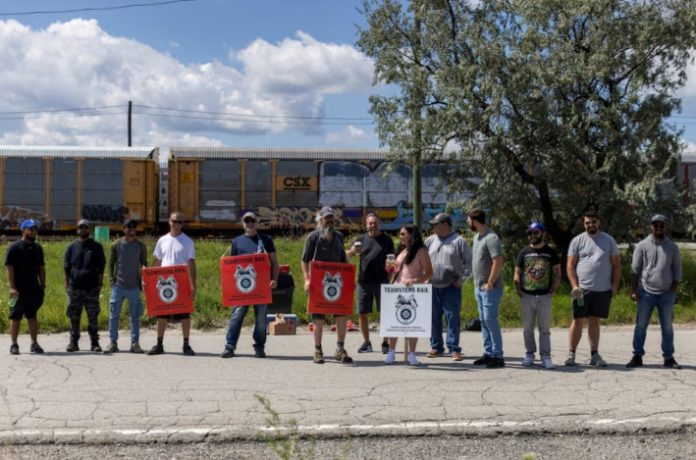The Canadian government has acted quickly to end an unprecedented rail shutdown, announcing that it will ask the country’s Industrial Relations Board to issue a reopening order, which should come soon.
The union said the work stoppage at Canadian Pacific Kansas City will continue until it receives an order from the Canadian Industrial Relations Board (CIRB). The union and company representatives were scheduled to meet with the board Friday morning.
Canada’s two leading railways, Canadian National Railway (CN) and Canadian Pacific Kansas City (CPKC), locked out more than 9,000 unionised workers on Thursday, causing a simultaneous rail shutdown that business groups say could cause hundreds of millions of dollars in economic damage.
The Canadian government announced on Thursday that it will ask the country’s Industrial Relations Board to issue a reopening order, which should come soon. The independent CIRB board will consult with companies and unions before issuing the order.
CN said it will end the lockout on Thursday at 6 p.m. CPKC said it was preparing to resume operations in Canada, and more details on timing would be provided once the CIRB order is received. Labour minister, Steven MacKinnon, told reporters:
I assume that the trains will be running within days.
In addition to the reopening order, MacKinnon asked the board to begin the process of binding arbitration between the Teamsters union and the companies, and to extend the current labour agreements until new ones are signed. The parties blamed each other for the work stoppage after multiple rounds of negotiations failed to reach an agreement.
Rail protest affected the economy
Early Friday morning, the Teamsters union released a statement on the X website saying it had taken down picket lines at CN.
CN spokesman Jonathan Abecassis told the Canadian Broadcasting Corporation that it could take a week or more for the company to catch up on supplies. An unprecedented shutdown of rail service could severely damage Canada’s economy and have a significant impact on cross-border trade with the US.
Canada is the second largest country in the world by land area and its economy is heavily dependent on rail transport. A train shutdown would paralyse grain, potash and coal shipments and slow the transport of petroleum products, chemicals and automobiles. Canada’s railways transport about 380 billion Canadian dollars ($277 billion) worth of goods each year.
Rail companies have previously said they were forced into a lockout to avoid strikes as soon as possible. They said they negotiated in good faith and made several offers to improve pay and working conditions.
The shutdown has halted shipments of grain, potash and coal, and slowed the transport of petroleum products, chemicals and cars.
Tens of thousands of people who depend on some commuter rail lines in Toronto, Vancouver and Montreal were also affected by the lockout as train service on those CPKC-owned lines was halted indefinitely.
According to union and company officials, the reason for the shutdown was mainly due to work schedules, labour availability and demands for better work-life balance. Ottawa introduced new duty and rest rules in 2023.
